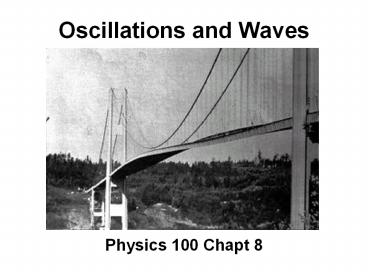Oscillations%20and%20Waves - PowerPoint PPT Presentation
Title:
Oscillations%20and%20Waves
Description:
Oscillations and Waves Physics 100 Chapt 8 Equilibrium (Fnet = 0) Examples of unstable Equilibrium Examples of Stable equilibrium Destabilizing forces Destabilizing ... – PowerPoint PPT presentation
Number of Views:514
Avg rating:3.0/5.0
Title: Oscillations%20and%20Waves
1
Oscillations and Waves
- Physics 100 Chapt 8
2
Equilibrium (Fnet 0)
3
Examples of unstable Equilibrium
4
Examples of Stable equilibrium
5
Destabilizing forces
N
Fnet 0
W
6
Destabilizing forces
N
Fnet away from equil
W
7
Destabilizing forces
Fnet away from equil
N
W
destabilizing forces always push the system
further away from equilibrium
8
restoring forces
N
Fnet 0
W
9
restoring forces
N
Fnet toward equil.
W
10
restoring forces
N
Fnet toward equil.
W
Restoring forces always push the system back
toward equilibrium
11
Pendulum
N
W
12
Mass on a spring
13
Displacement vs time
Displaced systems oscillate around stable equil.
points
amplitude
Equil. point
period (T)
14
Simple harmonic motion
Pure Sine-like curve
T
Equil. point
T period time for 1 complete oscillation
1/T
f frequency of oscillations/time
15
Masses on springs
Animations courtesy of Dr. Dan Russell, Kettering
University
16
Not all oscillations are nice Sine curves
A
Equil. point
T
f1/T
17
Natural frequency
f (1/2p)?k/m
f (1/2p)?g/l
18
Driven oscillators
natural freq. f0
f 0.4f0
f 1.1f0
f 1.6f0
19
Resonance (ff0)
20
Waves
Animations courtesy of Dr. Dan Russell, Kettering
University
21
Wave in a string
Animations courtesy of Dr. Dan Russell, Kettering
University
22
Pulsed Sound Wave
23
Harmonic sound wave
24
Harmonic sound wave
25
Harmonic wave
Wave speed v
Shake end of string up down with SHM period T
wavelength l
l T
distance time
wavelength period
Wave speed v
fl
Vfl or fV/ l
but 1/Tf
26
Reflection (from a fixed end)
Animations courtesy of Dr. Dan Russell, Kettering
University
27
Reflection (from a loose end)
Animations courtesy of Dr. Dan Russell, Kettering
University
28
Adding waves
pulsed waves
Animations courtesy of Dr. Dan Russell, Kettering
University
29
Adding waves
Two waves in same direction with slightly
different frequencies
Wave 1
Wave 2
resultant wave
Beats
Animations courtesy of Dr. Dan Russell, Kettering
University
30
Adding waves
harmonic waves in opposite directions
incident wave
reflected wave
resultant wave
(standing wave)
Animations courtesy of Dr. Dan Russell, Kettering
University
31
Confined waves
Only waves with wavelengths that just fit in
survive (all others cancel themselves out)
32
Allowed frequencies
l 2L
f0V/l V/2L
Fundamental tone
f1V/l V/L2f0
lL
1st overtone
l(2/3)L
f2V/lV/(2/3)L3f0
2nd overtone
lL/2
f3V/lV/(1/2)L4f0
3rd overtone
l(2/5)L
f4V/lV/(2/5)L5f0
4th overtone
33
Ukuleles, etc
l0 L/2 f0 V/2L
l1 L f1 V/L 2f0
l2 2L/3 f2 3f0
L
l3 L/2 f3 4f0
Etc
(V depends on the Tension thickness Of the
string)
34
Doppler effect
35
Sound wave stationary source
Wavelength same in all directions
36
Sound wave moving source
Wavelength in forward direction is shorter
(frequency is higher)
Wavelength in backward direction is longer
(frequency is higher)
37
Waves from a stationary source
Wavelength same in all directions
38
Waves from a moving source
v
Wavelength in backward direction is longer
(frequency is higher)
Wavelength in forward direction is shorter
(frequency is higher)
39
surf
40
Folsom prison blues
long wavelengths
Short wavelengths
41
Confined waves































